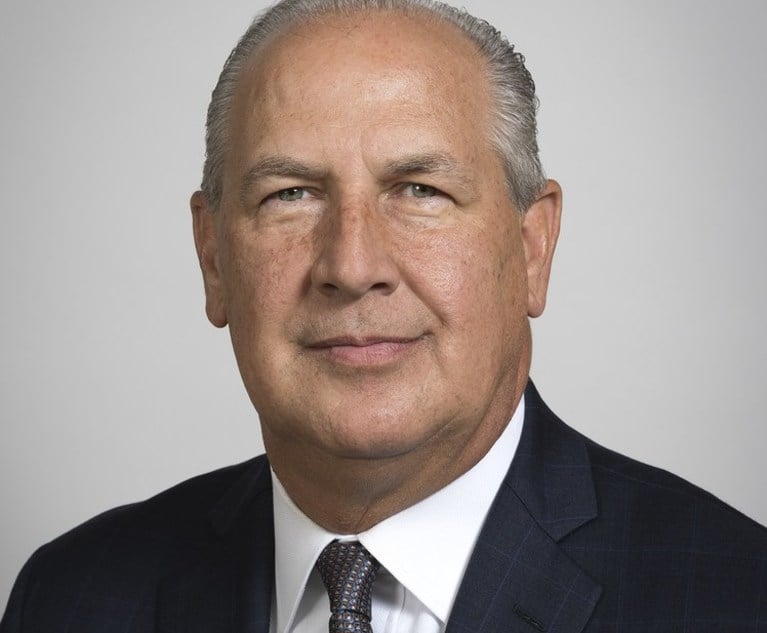Opioid Makers Demand an 'Untenable Level of Specificity' in Dismissal Motions, Says Judge's Report
U.S. Magistrate Judge David Ruiz on Oct. 5 allowed most of the claims in a key case in a massive MDL against opioid companies to go forward, concluding that the complaint was far from a “fishing expedition.”
October 09, 2018 at 07:00 AM
6 minute read
The original version of this story was published on Law.com
A federal judge's report and recommendation in a key case over the opioid crisis could, if approved, bode well for cities and counties suing prescription painkiller manufacturers and distributors.
U.S. Magistrate Judge David Ruiz of the Northern District of Ohio on Oct. 5 allowed most of the claims to go forward in a case brought by Summit County and the city of Akron against manufacturers and distributors of opioids, plus several pharmacies. He found that, despite the insistence of defendants that the complaint lacked details, the case was far from a “fishing expedition.”
“Defendants' motion to dismiss demands an untenable level of specificity above and beyond the pleading rules,” Ruiz wrote. “Plaintiffs cannot be expected to plead the minutiae of their case without the benefit of discovery.”
The report is the first to go before U.S. District Judge Dan Polster, who is overseeing the opioid multidistrict litigation in Cleveland. If approved, the report could influence more than 1,200 lawsuits primarily brought by cities, counties and other municipalities to recoup governmental costs tied to the epidemic, which has caused a surge in deaths and addictions.
Lead plaintiffs lawyers in the multidistrict litigation—Paul Farrell of Greene, Ketchum, Farrell, Bailey & Tweel in Huntington, West Virginia; Paul Hanly of Simmons Hanly Conroy in New York; and Joseph Rice of Motley Rice in Mount Pleasant, South Carolina—called the report a “major step forward” in the MDL. It could also prove tough for the defendants going forward, Carl Tobias, a professor at the University of Richmond School of Law, told Law.com.
“[Ruiz] seems less worried about the particulars and a lot of specifics, given what he perceives to be their behavior in playing a large role,” Tobias said, “He feels the cause-and-effect linkage is made, at least preliminarily. That's not good news for the defendants.”
Striking down some key legal defenses, Ruiz allowed claims like negligence and fraud to go forward.
Richard Ausness, a professor at the University of Kentucky College of Law, who has been following the opioid litigation, said the report came as little surprise.
“It was interesting that so much of the report dealt with the RICO claim,” he wrote in an email. “That is probably the plaintiffs' strongest claim. The refusal to dismiss the fraud, civil conspiracy and negligence claims is to be expected since they involve so many factual issues.”
Ruiz spent nearly half his 103-page report on claims brought under the U.S. Racketeer Influenced and Corrupt Organizations Act. In what he called a “crucial question in this litigation” he disagreed with defendants that the RICO claims were derivative of the personal injuries of addicts and, therefore, not “business or property.” Plaintiffs had alleged injuries such as public expenditures and lost tax revenue.
“Defendants' contentions turn a blind eye to allegations that allege much more,” Ruiz wrote. He also refuted defendants' claims that the plaintiffs had to name specific doctors who prescribed the painkillers. And he found that the contributions of prescribing doctors and criminals involved in illegal drug use did not negate the defendants' role in contributing to the epidemic.
“Plaintiffs, local governments, have been impacted by the opioid epidemic,” Ruiz wrote. “The connection between their injuries and the defendants' alleged racketeering and fraudulent activity is not so attenuated, as their injuries plainly stem from opioid use/abuse and not some possible other source.”
Ruiz also ruled out federal pre-emption since the state law claims are “not premised upon inappropriate labeling or a fraud upon the FDA, but rather fraudulent marketing in the promotion and sale of their opioids.”
The report did give some help to defendants in dismissing some public nuisance claims due to the Ohio Product Liability Act.
Most of the manufacturing defendants, which include Purdue Pharma, Endo Health Solutions and Teva Pharmaceuticals, declined to comment or did not respond when asked about the report.
Janssen Pharmaceuticals Inc., a division of Johnson & Johnson, wrote in an email: “Our actions in the marketing and promotion of these medicines were appropriate and responsible. The labels for our prescription opioid pain medicines provide information about their risks and benefits, and the allegations made against our company are baseless and unsubstantiated.”
A spokesperson for the Healthcare Distribution Alliance, which represents distributors AmerisourceBergen Drug Corp., Cardinal Health Inc. and McKesson Corp., did not respond to a request for comment.
Much of the report's findings were similar to an Aug. 22 decision by a state judge who refused to dismiss claims in the state of Ohio's case. In both cases, the judges looked to a 2002 decision by the Ohio Supreme Court, in City of Cincinnati v. Beretta USA, in which the city of Cincinnati brought similar claims against gun manufacturers.
There also have been other dismissal orders in opioid cases outside the MDL. On Oct. 5, a state court judge in Tennessee granted dismissal in a case involving seven district attorneys suing opioid manufacturers on behalf of counties and cities. The judge disagreed that the defendants were running an “illegal drug market” in violation of the Tennessee Drug Dealer Liability Act.
On Oct. 2, a state court judge tossed public nuisance claims in the state of New Jersey's case against opioid maker Purdue Pharma but allowed other claims to go forward.
State court judges in the state of Alaska's case and a consolidated action by several New York counties have refused to dismiss their claims against opioid companies.
In the MDL, the defendants have filed motions to dismiss in several other bellwether lawsuits, including those by various cities and counties in Illinois, Florida, Michigan and West Virginia, as well as the state of Alabama. Native American tribes and hospitals also face motions to dismiss consolidated complaints. Decisions on those motions could be soon.
“The first one is always important, but with MDLs it's not the last word because there will be other bellwethers,” Tobias said.
This content has been archived. It is available through our partners, LexisNexis® and Bloomberg Law.
To view this content, please continue to their sites.
Not a Lexis Subscriber?
Subscribe Now
Not a Bloomberg Law Subscriber?
Subscribe Now
NOT FOR REPRINT
© 2025 ALM Global, LLC, All Rights Reserved. Request academic re-use from www.copyright.com. All other uses, submit a request to [email protected]. For more information visit Asset & Logo Licensing.
You Might Like
View All
Montgomery McCracken Touts 'Record' Financial Performance Despite Shrinking Head Count
6 minute read
Class Action Settlements Totaled $40B+ Three Years in a Row: 'We’re in a New Era'
5 minute read
AI's Place in Big Law Broadens, As Firms Embrace Fresh Uses of the Technology
Trending Stories
Who Got The Work
J. Brugh Lower of Gibbons has entered an appearance for industrial equipment supplier Devco Corporation in a pending trademark infringement lawsuit. The suit, accusing the defendant of selling knock-off Graco products, was filed Dec. 18 in New Jersey District Court by Rivkin Radler on behalf of Graco Inc. and Graco Minnesota. The case, assigned to U.S. District Judge Zahid N. Quraishi, is 3:24-cv-11294, Graco Inc. et al v. Devco Corporation.
Who Got The Work
Rebecca Maller-Stein and Kent A. Yalowitz of Arnold & Porter Kaye Scholer have entered their appearances for Hanaco Venture Capital and its executives, Lior Prosor and David Frankel, in a pending securities lawsuit. The action, filed on Dec. 24 in New York Southern District Court by Zell, Aron & Co. on behalf of Goldeneye Advisors, accuses the defendants of negligently and fraudulently managing the plaintiff's $1 million investment. The case, assigned to U.S. District Judge Vernon S. Broderick, is 1:24-cv-09918, Goldeneye Advisors, LLC v. Hanaco Venture Capital, Ltd. et al.
Who Got The Work
Attorneys from A&O Shearman has stepped in as defense counsel for Toronto-Dominion Bank and other defendants in a pending securities class action. The suit, filed Dec. 11 in New York Southern District Court by Bleichmar Fonti & Auld, accuses the defendants of concealing the bank's 'pervasive' deficiencies in regards to its compliance with the Bank Secrecy Act and the quality of its anti-money laundering controls. The case, assigned to U.S. District Judge Arun Subramanian, is 1:24-cv-09445, Gonzalez v. The Toronto-Dominion Bank et al.
Who Got The Work
Crown Castle International, a Pennsylvania company providing shared communications infrastructure, has turned to Luke D. Wolf of Gordon Rees Scully Mansukhani to fend off a pending breach-of-contract lawsuit. The court action, filed Nov. 25 in Michigan Eastern District Court by Hooper Hathaway PC on behalf of The Town Residences LLC, accuses Crown Castle of failing to transfer approximately $30,000 in utility payments from T-Mobile in breach of a roof-top lease and assignment agreement. The case, assigned to U.S. District Judge Susan K. Declercq, is 2:24-cv-13131, The Town Residences LLC v. T-Mobile US, Inc. et al.
Who Got The Work
Wilfred P. Coronato and Daniel M. Schwartz of McCarter & English have stepped in as defense counsel to Electrolux Home Products Inc. in a pending product liability lawsuit. The court action, filed Nov. 26 in New York Eastern District Court by Poulos Lopiccolo PC and Nagel Rice LLP on behalf of David Stern, alleges that the defendant's refrigerators’ drawers and shelving repeatedly break and fall apart within months after purchase. The case, assigned to U.S. District Judge Joan M. Azrack, is 2:24-cv-08204, Stern v. Electrolux Home Products, Inc.
Featured Firms
Law Offices of Gary Martin Hays & Associates, P.C.
(470) 294-1674
Law Offices of Mark E. Salomone
(857) 444-6468
Smith & Hassler
(713) 739-1250







